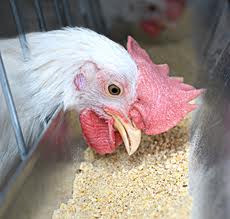The toxicity of Fusarium mycotoxin deoxynivalenol in poultry feeding

Deoxynivalenol (DON) is prevalent worldwide in crops used for food and feed production. The presence of mycotoxins in poultry feeds is a significant factor contributing to financial losses in animal industries.
DON causes losses in livestock production and poses a health problem to livestock and humans consuming contaminated cereal products. Although DON is one of the least acutely toxic trichothecenes, it should be treated as an important food safety issue because it is a very common contaminant of grains. Poultry respond to increasing dietary DON concentrations with a reduction in productivity only at high levels; above 5 mg/kg but there is no evidence of a clear dose-response relationship. Poultry fed low to moderate doses are able to recover from initial weight losses, while higher doses induce more long-term changes in feeding behaviour. At low dosages of DON, haematological, clinical and immunological changes are transitory and decrease as compensatory/adaptation mechanisms are established. The exposure to higher dose levels of DON are mainly expressed as severe reductions in body weight and impaired resistance to infection, particularly bacterial infection. Common symptoms of acute toxicity of DON are nausea, vomiting, dermal irritation and lesions, haemorrhagic lesions, and pathological changes in the haemopoietic organs. The capacity of DON to alter normal gut and immune function has been of particular interest. One important aspect of DON toxicity is an injury of the gastrointestinal tract. It was found that DON had an influence on intestinal nutrient absorption and the intestinal morphology of chickens, especially in the duodenum and jejunum, as evidenced by shorter and thinner villi. DON decreases glucose and amino acid absorption in the chicken’s small intestine in vivo and in vitro and this effect is apparently mediated by the inhibition of the sodium D-glucose co-transporter. It was found that immune function decreased in broiler Leghorn chicks that were fed DON-contaminated diets. It induces changes in the hematopoietic system of chicks and alters immune response, whereas, DON impairs mitogen-induced proliferation of lymphocytes. The feeding of DON-contaminated grains decreased serum antibody titers against Newcastle disease virus (NDV) and infectious bronchitis (IB) in laying hens and broilers. The impact of DON on the immune system and gastrointestinal tract are important to define the maximum tolerable levels of DON in animal feedstuffs. The purpose of this review is to summarise the information to date regarding the toxicological and immunological effects of DON on poultry.











Vélemény, hozzászólás?
Hozzászólás küldéséhez be kell jelentkezni.